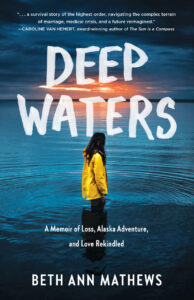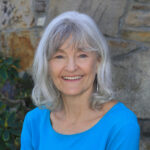Writer Beth Ann Mathews chats with me today about her memoir, Deep Waters: A Memoir of Loss, Alaska Adventure, and Love Rekindled.

Bio:
Beth Mathews is a marine biologist and mother of one son. She grew up in a large family in the Midwest and studied animal science at Purdue University. She earned her master’s degree in marine biology from the University of California at Santa Cruz. As a professor at the University of Alaska Southeast, she taught courses in biology, behavioral ecology, and marine mammalogy and led research on harbor seals, Steller sea lions, and harbor porpoises. She has also studied humpback, gray, and sperm whales and—briefly—sleeper sharks, and led undergraduate research programs on board tall ships in the Gulf of Maine and from field camps in Hawaii and Alaska. Beth has published scientific papers (Elizabeth A. Mathews), and a chapter from Deep Waters placed second in the 2018 Redwood Writers Memoir Contest. Deep Waters is Beth’s first book.
Please tell us about your current release.
My fulfilling, adventurous life as a wife, mother, and marine biology professor in Alaska is upended when my healthy husband is slammed by a rare type of stroke. Jim’s radical approach to recovery includes month-long trips on our sailboat with me and our young son in Alaska. His plans clash with my instinct to keep him safe at home and sets us on a collision course. After I rescue Jim during two boating incidents, my fear of losing him at sea is amplified. When I learn his survivor’s goal is a multi-year sailing expedition, I question my ability to live up to his expectations. Should I risk my job as a professor to pursue a less secure, but more empowering and connected future?
What inspired you to write this book?
After his stroke, I witnessed how hard my husband fought to walk, swim, and ride a bike again. Moved by his determination, I wrote about those situations as some were unfolding, but that was not with a book in mind. Before that, I wrote letters home and journal entries about our adventures living and exploring on our boat in Alaska, my work as a marine mammal field biologist, raising our son in Juneau, and fishing and hunting trips. I wanted to capture the beauty and natural wonders we experienced.
Pivotal inspiration to write a book came from colleague and friend, Dan T. O’Neill, an investigative journalist from Alaska, who has written several award-winning books, including The Firecracker Boys. Over coffee one morning the summer after my husband’s medullary stroke, Dan encouraged me to write a book about our family’s experiences. His idea was based on posts I’d made to the CaringBridge Blog during my husband’s hospitalization and recovery. Dan’s belief in me as a writer was instrumental in my decision to write Deep Waters.
In writing classes and critique groups, I received encouraging feedback on chapters about dramatic, life-threatening situations we faced and overcame at sea, as well as deeply personal scenes. For caregivers in similar situations, some the difficulties I experienced of juggling roles of medical advocate, wife, mother, and bread-winner, are likely to resonate.
It wasn’t until I had a full draft that I realized scenes scattered throughout the book might help other couples and family’s respond to a medical crisis and that my story could inspire readers to invest more in worthwhile, but neglected, relationships.
Excerpt from Deep Waters:
(Scene takes place in Juneau, Alaska’s hospital. A few hours earlier, my healthy husband, was slammed by a rare type of stroke caused by doing a household chore. David is a friend who works at the hospital who happened to see me in the emergency waiting room. Glen is our son.)
“Hey, Beth.” David got my attention from the hallway after we’d returned from lunch. Glen was with Kim. “I need to talk to you—in private.” He gestured me away from the nurses’ station. We stood face to face. His hazel eyes drew me in. “You know, Bartlett’s a great hospital.” He stroked his goatee. “I love my job. Everyone works hard. They’re good at what they do.” His face tensed.
“But this situation is serious. We’re a small county hospital. Jim needs experts, and he needs them now.”
I took in each word, absorbing the weight of their truth.
“You’ve got to get him out of here—to Anchorage or Seattle. That’ll only happen if you’re firm with his doctor. When she gets here, you have to insist he’s medevacked to a bigger hospital.”
My breathing became labored as if I’d broken the surface after a long dive.
He continued, “There’s this odd situation between the insurance and doctors. It costs a lot to evacuate someone out of Juneau. The docs are under pressure from insurance companies to keep patients here. Your nature is to be agreeable, but you need to do this. For Jim. You’ve got to insist he gets on that Learjet and taken to a larger center. You’ll be doing your doctor a favor. If you don’t push this, she’ll be reluctant to order it. If you do, she’ll have to try.”
Juneau was surrounded by mountains, glaciers, and ocean with no roads out—no big medical centers nearby. Since we’d arrived at Bartlett, I’d passed the responsibility baton off to the medical team. I’d relinquished my decision-making role, expecting them to do what was best for my husband. But now our friend was telling me to step forward, take command, steer this crisis down a different path.
David glanced at his watch. “I’ve got to get back to my office. If you have any problems, call me.” He placed his business card in my palm.
“Thank you.” I hugged him hard. Taught to respect authority, politely follow the advice of professionals, my pulse quickened with dread.
“The other thing.” He glanced over his shoulder. “There’s one medevac jet for all of Alaska. It goes back and forth. You need to get on their list right away. If another, more critical, emergency comes up, they’ll bump him. And I don’t know if the plane is in Seattle or Anchorage or here.”
What exciting story are you working on next?
I’ve completed the manuscript for my second book, which takes place 20 years before Deep Waters. Fateful Decisions, my working title, is an adventure memoir with relationship tension, research on whales from tall ships in the North Atlantic and a field camp on a Hawaiian island.
When did you first consider yourself a writer?
In my career as a marine biologist, I published and co-authored scientific papers. But I did not consider myself a writer until I published my first piece of creative nonfiction. In 2012, SAIL Magazine published my story, “Snagged!” in their “Voice of Experience” feature.
Do you write full-time? If so, what’s your work day like? If not, what do you do other than write and how do you find time to write?
I’m retired and so I don’t think of myself as being a full-time writer. My husband, however, reminds me that I spend as much time writing, or tending to tasks related to publishing, as I did when I taught and did research at the university.

I love learning and a lot of my writing involves researching a topic and learning how to be a better writer. Consequently, those pursuits don’t feel like work. Reading good books is another crucial part of improving my writing. If I add those activities to the actual time at my laptop composing sentences and scenes, most weeks I easily spend more than forty hours writing. And so, I have to agree, if forty-hours is the bench-mark for full time, my husband is right.
I like to be the first one up in our household. I’m usually making coffee by 6:00 AM and at my desk right after I slip quietly into our bedroom and leave a steaming mug on my husband’s nightstand. Around nine, my husband and I have breakfast and afterwards, I walk our dog. Several times a week, I head to a café, where I find it easier to focus. At home, the temptation to multi-task builds and my efficiency goes in the opposite direction. Most afternoons, I take care of household chores and errands. I enjoy hiking, birding, and wildlife photography.
To stay balanced, I need time in nature. My husband is an avid bike-rider. He’s good at coaxing me out from my office to ride with him when I’ve spent too much time tapping on a keyboard and it’s time put my legs to work.
What would you say is your interesting writing quirk?
A writing quirk I have is that I sometimes play loud music to sustain, or shift into, a mood pertinent to a scene I’m working on. Certain songs can transport me to a state of mind I need to be in to re-live and write about something that happened a years ago.
As is the case for a lot of people, music from the time period of an experience can do this, but I love it when I find singer songwriters across the decades who speak to me—from Joni Mitchell to Taylor Swift and Maggie Rogers.
As a child, what did you want to be when you grew up?
I was not clear about what I wanted to do, but I liked being outdoors and enjoyed training our family dog, an Irish setter. I also yearned to have my own horse. Although I took riding lessons, I only read about other girls who were so lucky to have a horse. From those loose passions, the idea of becoming a veterinarian floated into my mind.
During sophomore year of college, I submitted one application to a veterinary school. I must not have been too serious, because when I didn’t get in, I abandoned that idea, finished my B.S. degree in animal science, and moved on.
I pursued and was offered a life-changing job as a zookeeper for three years which paved the way for me to volunteer on a humpback whale research project in Hawaii. That unusual and inspiring experience, in turn, led to a graduate degree in marine science and becoming a marine mammal biologist—a career I did not dream of as a child growing up in southern Indiana.
Anything additional you want to share with the readers?
I’m excited about my upcoming book tour with events scheduled in California, Washington, Alaska, and Indiana, and others pending. To attend a book launch, hear an interview, or schedule a virtual book club reading or discussion, readers are invited to visit my website.
Thank you for this opportunity!
